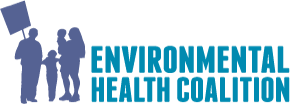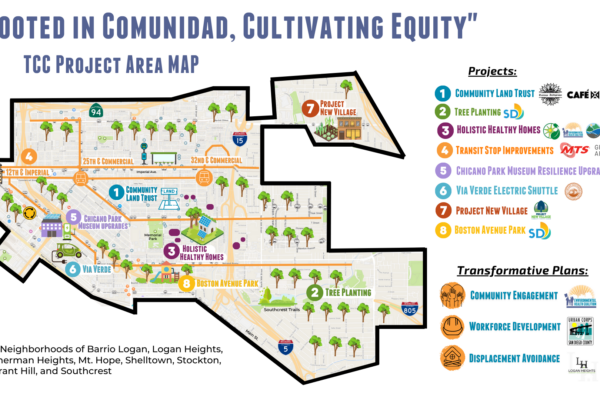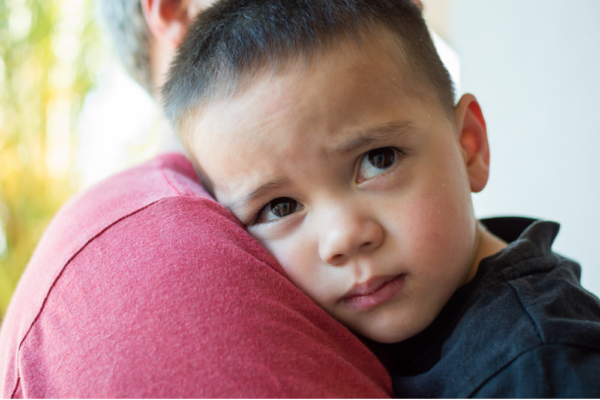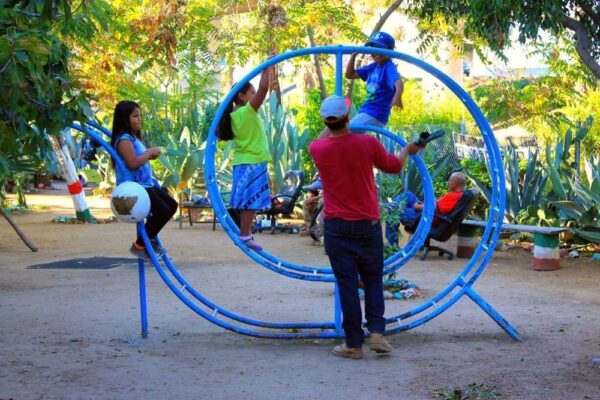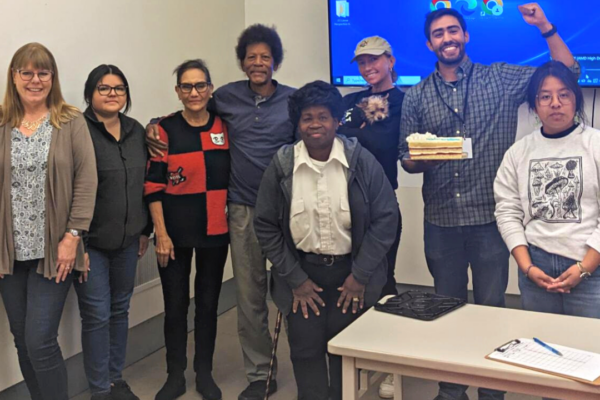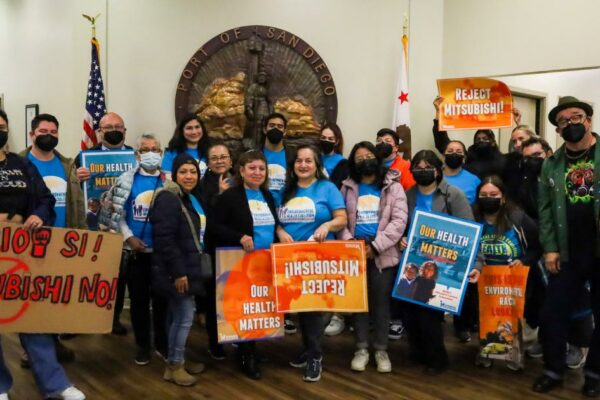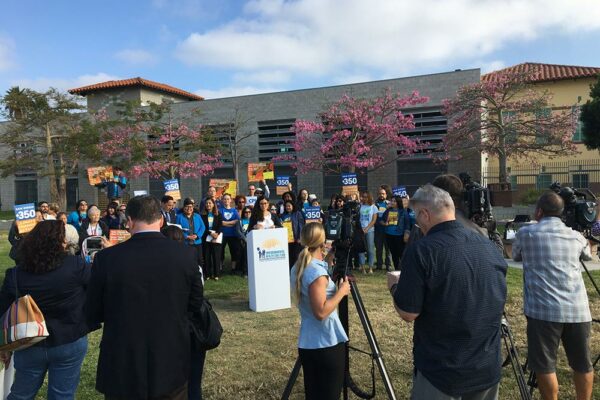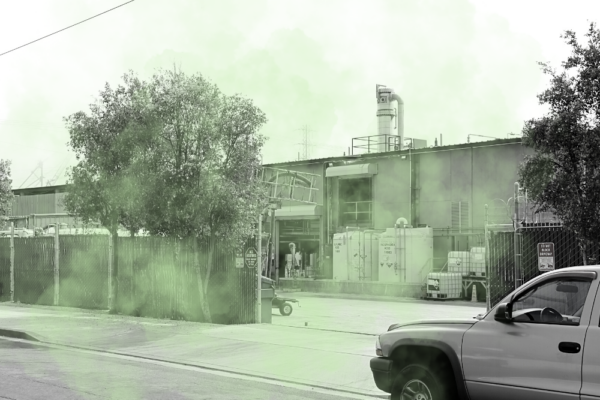$20M for Climate Resiliency in Central Historic Barrios
FOR IMMEDIATE RELEASE
San Diego Foundation Selected to Receive $20M U.S. Environmental Protection Agency Grant to Support Sustainability, Climate Resiliency in Central Historic Barrios
Grant to Fully Fund Transformative Climate Communities Local Health Initiative
SAN DIEGO (July 25, 2024)—San Diego Foundation (SDF) announced today that the U.S. Environmental Protection Agency has selected it to receive $19,999,317 for its joint initiative with the Environmental Health Coalition to help fund climate-resilient projects that will preserve, protect and strengthen San Diego’s central historic barrios.
“We are grateful to the EPA for recognizing how transformational this funding will be for San Diegans,” said Mark Stuart, President & CEO, SDF. “This federal grant is an endorsement of our coalition of partners and community-driven approach to fund much-needed projects that will improve the health and lives of residents in our central historic barrios and create a healthier, more vibrant and resilient community,”
The EPA grant will be combined with a previously announced $22 million grant received in December 2023 from the California Strategic Growth Council for the Transformative Climate Communities initiative, “Rooted in Comunidad, Cultivating Equity.”
“San Diego’s central historic barrio communities are especially vulnerable to the impacts of climate change like extreme heat or wildfires, because of existing toxic pollution, disinvestment and chronic disease like asthma,” said José Franco García, Executive Director, Environmental Health Coalition. “Residents that suffer these conditions have voiced the community’s need for investments in clean air, green spaces, healthy homes and pollution-free transit. Now, we can put their vision into action in order to help their families and neighbors thrive for generations to come.”
“Today’s announcement is welcome news for families in San Diego and across the region. This funding demonstrates our continued commitment to addressing long-standing environmental and climate justice challenges and investing in the health and wellbeing of our communities,” said Representative Juan Vargas (CA-52). “I’m proud to have voted for the Inflation Reduction Act to support projects just like this one and look forward to seeing the positive impacts to come.”
“Efforts to address climate change need to include all communities, especially neighborhoods that have historically been underfunded. The nearly $20 million in Environmental and Climate Justice Community Change grant money coming to San Diego will fund much-needed improvements to air quality, expand access to clean public transportation, and provide green space that will mitigate extreme heat and beautify neighborhoods. This is another great example of how the Biden-Harris administration’s Inflation Reduction Act is truly helping all Americans,” said Representative Scott Peters (CA-50).
Through the grants, the neighborhoods encompassing San Diego’s central historic barrios will experience unprecedented investment in green spaces, housing and transportation, community-led food production and distribution, and community centers, among other climate-resilient and community benefit projects. San Diego’s central historic barrios include the seven neighborhoods of Logan, Stockton, Grant Hill, Mt. Hope, Sherman, Southcrest and Shelltown. For a full description of projects, visit the Environmental Health Coalition’s project proposal website.
In 2022, Environmental Health Coalition and SDF, along with 10 partners, worked to ensure their project plan was grounded in the community and led by the community. During the application-building period for the California Strategic Growth Council, Environmental Health Coalition hosted a survey and two community workshops that included participation and feedback from 400-plus community members.
The EPA grant is one of seven awarded in California and one of 21 nationwide by the EPA during this inaugural round of funding. Selected applicants help disadvantaged communities tackle environmental and climate justice challenges through projects that reduce pollution, increase community climate resilience and build community capacity. Made possible by the federal Inflation Reduction Act, the Community Change Grants Program is the single-largest investment in environmental and climate justice in history. The funding announcement is the first tranche of nearly $2 billion from the program that was designed based on community input to award grants on a rolling basis. For more information on the Community Change Grants Program and a full listing of awards, visit EPA.gov.
About San Diego Foundation
San Diego Foundation inspires enduring philanthropy and enables community solutions to improve the quality of life in our region. Our strategic priorities include advancing racial and social justice, fostering equity of opportunity, building resilient communities, and delivering world-class philanthropy to realize our vision of just, equitable and resilient communities. The Environment Initiative preserves and protects our resources, builds a more sustainable path of economic growth and ensures a higher quality of life for those who call San Diego home. For nearly 50 years, SDF and its donors have granted $1.8 billion to support nonprofit organizations strengthening our community. Learn more at SDFoundation.org.
###
Contact: Lorena Nava Ruggero, lruggero@sdfoundation.org, 619-814-1365
Does your home have toxic lead?
Homeowners Can Now Apply for City of San Diego’s Low or No-Cost Lead Paint Hazard Abatement Services
San Diego residential lead abatement program is the result of a multi-million dollar legal settlement
Thursday, April 18, 2024
SAN DIEGO – Lead paint is the primary source of childhood lead poisoning, and thanks to a multi-million-dollar legal settlement with three paint companies, the service to remove toxic lead hazards – a process called abatement – is available for little or no cost to those who qualify. Homeowners in San Diego city limits can now apply for lead abatement services through the City of San Diego’s new San Diego Residential Lead Abatement Program (SDRLAP).
“After years of litigation against the lead paint industry, the City can finally use the recovered funds to provide essential abatement services to impacted neighborhoods,” said City Attorney Mara W. Elliott. “Scientific research shows that lead exposure imperils the health and safety of our residents and their children. The City’s abatement program should help alleviate those risks.”
The City’s abatement program is the result of a settlement reached between three paint companies and 10 California jurisdictions. ConAgra Grocery Products Co., NL Industries Inc. and Sherwin-Williams Company agreed to pay into a fund to remove toxic lead paint hazards from residential properties, with San Diego being awarded $15 million. The primary purpose of the funding is to remediate lead paint hazards in low- to moderate-income areas.
“Lead exposure through deteriorated lead paint continues to be one of the biggest environmental health concerns facing children today,” said Environmental Services Department (ESD) Program Manager Jessica Weislogel. “Reducing and preventing exposure through abatement activities is one way to help children live healthier lives.”
Lead poisoning can cause adverse effects on a child’s development and later in adulthood. In San Diego County between 2017 and 2021, 231 children under the age of six received services from the San Diego County Childhood Lead Poisoning Prevention Program (CLPPP) due to lead poisoning. Even small levels of lead in a child’s blood can cause permanent damage including developmental, health and behavioral problems. More information about the effects of lead poisoning is available at sdhealthyhomes.org.
The City is currently accepting SDRLAP applications from anyone who owns residential property. Properties that qualify for the program will be inspected and abated of lead hazards if they are present. In some cases, temporary relocation of residents may be required during abatement activities, and in those cases, temporary relocation services will be provided. All services will be conducted with confidentiality. Renters are encouraged to learn more about the program and to work with their landlords, as only residential property owners can apply.
To apply or get more details, contact Laura at 619-768-8047, or LauraB@environmentalhealth.org.
About the Environmental Services Department (ESD):
ESD ensures that City of San Diego residents have a clean and safe environment. The department pursues waste management strategies that emphasize waste reduction, recycling and composting, and environmentally sound landfill management.
$22M Grant for Climate Projects in Central Historic Barrios
FOR IMMEDIATE RELEASE
Environmental Health Coalition, San Diego Foundation to Receive $22M Grant for Climate Projects in Central Historic Barrios
The funding is the first Transformative Climate Communities implementation grant to benefit San Diego County since the California Strategic Growth Council’s start in 2016.
SAN DIEGO (Dec. 18, 2023) – San Diego Foundation and Environmental Health Coalition announced today that they have been awarded $22 million by the California Strategic Growth Council for their Transformative Climate Communities application to help fund climate-resilient projects that will preserve, protect and strengthen San Diego’s central historic barrios.
“Along with our partners, we produced a unique application with a community-informed process led by a collective of regional nonprofits that included participation and feedback from 400-plus community members,” said Mark Stuart, President and CEO of San Diego Foundation, which served as lead applicant on the grant application. “We are confident that through this grant, San Diego will become a much more just, equitable and resilient community.”
In total, San Diego Foundation and Environmental Health Coalition hope to leverage the grant award, plus $26 million in matching funds and other funding, to invest a total $48 million in San Diego’s central historic barrios. Through the grant, the neighborhoods will experience unprecedented investment in green spaces, housing and transportation, community-led food production and distribution, community centers, among other climate-resilient and community benefit projects. San Diego’s central historic barrios include the seven neighborhoods of Logan, Stockton, Grant Hill, Mt. Hope, Sherman, Southcrest, and Shelltown.
“Our communities have not gotten the investment and attention we need and deserve, resulting in these majority-minority neighborhoods being some of the San Diego communities that are most vulnerable to climate impacts such as extreme heat and poor air quality,” said José Franco García, Executive Director of Environmental Health Coalition. “This grant is a critical step in empowering San Diego’s most impacted communities to determine how to strengthen their neighborhoods against the threat of climate change and pollution to breathe clean air, live healthy lives and thrive.”
In 2022, Environmental Health Coalition and San Diego Foundation, along with 10 partners, worked to ensure their Transformative Climate Communities application, dubbed “Rooted in Comunidad, Cultivating Equity,” was grounded in the community and led by the community. During the application-building period, Environmental Health Coalition hosted a survey and two community workshops to get direct resident feedback.
The list of proposed projects includes:
- Tierras Indigenas Community Land Trust, a nonprofit working to purchase land in the Historic Barrios to ensure the housing and buildings built will remain affordable and community-owned for future generations.
- Holistic Healthy Homes Program, through a coalition of six community-based organizations, will improve indoor air quality in 25 homes through a “healthy homes make-over” that will include indoor electric and air quality upgrades, water-tolerant xeriscaping and other home repairs.
- Trolley and Bus Stop Improvements through San Diego Metropolitan Transit System will upgrade key transit centers and bus stops to make public transit in the area easier, safer and more convenient.
- Chicano Park Museum and Cultural Center solar panel installation to reduce harmful carbon emissions while providing clean, renewable energy for the center that provides families a space to gather, study and celebrate Chicano culture, and find respite from hot temperatures, air toxicity, rolling blackouts and power outages.
- Via Verde Free Electric Shuttle to provide free, bilingual, on-demand electric vehicle shuttle service that will safely and efficiently provide door-to-destination transportation in Barrio/Logan Heights.
- Project New Village Community Gardens and Resource Center will include a 12,000-square-foot food center to support community-led food production, aggregation and distribution.
- Boston Avenue Park will be located along Boston Avenue and serve as a buffer between the I-5 freeway and the residential neighborhood, with 8-foot-high, vine-covered walls; two playgrounds; an off-leash dog park; pedestrian walkways; community art spaces and a bike path that will connect to the Chollas Creek bikeway.
- Plant 700+ Trees through the City of San Diego in empty right-of-way locations in the project area to improve air quality, increase shade, decrease temperature and beautify public spaces.
Transformative Climate Communities is an initiative by the Strategic Growth Council, with the California Department of Conservation. The program funds community-led development and infrastructure projects that achieve major environmental, health and economic benefits in California’s most disadvantaged communities. Transformative Climate Communities empowers the communities most impacted by pollution to choose their own goals, strategies and projects to enact transformational change.
About Environmental Health Coalition
Founded in 1980, Environmental Health Coalition (EHC) builds grassroots campaigns to confront the unjust consequences of toxic pollution, discriminatory land use, and climate change. Visit www.environmentalhealth.org to learn more.
About San Diego Foundation
San Diego Foundation inspires enduring philanthropy and enables community solutions to improve the quality of life in our region. Our strategic priorities include advancing racial and social justice, fostering equity of opportunity, building resilient communities, and delivering world-class philanthropy to realize our vision of just, equitable and resilient communities. For more than 48 years, SDF and its donors have granted $1.7 billion to support nonprofit organizations strengthening our community. Learn more at SDFoundation.org.
Contact:
Lorena Nava Ruggero, San Diego Foundation, lruggero@sdfoundation.org, 619-814-1365
Angelica Estrada, Environmental Health Coalition, angelicae@environmentalhealth.org, 562-708-3093
$44 MILLION IN FUNDING FOR SAN DIEGO’S ENVIRONMENTAL JUSTICE COMMUNITIES
FOR IMMEDIATE RELEASE
CONTACT
Angelica Estrada
angelicae@environmentalhealth.org
562-708-3093
Lorena Nava Ruggero
lruggero@sdfoundation.org
619-814-1365
UNPRECEDENTED COALITION SEEKS $44 MILLION IN FUNDING FOR SAN DIEGO’S ENVIRONMENTAL JUSTICE COMMUNITIES
Community, philanthropic, and government coalition calls on community members to help bring millions of state grant funding and matching funds to some of City of San Diego’s most polluted, climate-vulnerable and culturally rich communities – the Historic Barrios.
SAN DIEGO, CA, APRIL 17, 2023 – On Saturday, April 15, 2023, Mayor Todd Gloria, Councilmember Vivian Moreno, and a more than a dozen stakeholder coalition hosted a press conference to rally community support for a $44 million funding opportunity to fund climate-resilient projects in San Diego’s Historic Barrios – Barrio Logan, Logan Heights, Stockton, Grant Hill, Sherman, Southcrest and Shelltown. This opportunity includes a potential $29.5 million from the state’s Transformative Climate Communities Program (TCC), and $14.75 million in additional matching funds from municipal and private sources.
The Historic Barrios are some of San Diego’s communities most vulnerable to climate impacts such as extreme heat and poor air quality. Considered cultural gems, these majority-minority neighborhoods have suffered from environmental racism and rezoning that has led to decades of toxic pollution, chronic diseases, like asthma, and a higher risk of cancer.
“Air pollution and climate change are interlinked – the same diesel pollution that is exacerbating climate change, is damaging our lungs and making people more vulnerable to the impacts of climate change, such as heat waves and smoke from wildfires,” said Jose Franco Garcia, Executive Director, Environmental Health Coalition.
With high levels of poverty and rising rents, residents are at risk of eviction and displacement as their community is gentrified. Focusing on affordable housing, green spaces, and environmental health, projects funded by the grant will lead to a healthier, more vibrant, and resilient community.
“People move out of the neighborhood because of the cost of living,” said Elizabeth Chavez, Logan Heights resident and community activist. “And those who can’t afford end up in their vehicles. You need two sources of income – three if you want to live comfortably – to live here.”
The state grant and matching funds could be used to develop a Community Land Trust to secure land, create housing opportunities, keep families in their homes and slow gentrification. Other potential projects include community-wide home improvements such as solar, planting 800 trees to reduce pollution and more frequent transit stops.
“The plan that our coalition is putting together is a visionary, community-driven approach that will serve as a model that we can share with other cities to empower local communities,” said Mark Stuart, president and CEO of San Diego Foundation, the lead applicant on the Transformative Climate Communities proposal that is working with partners to secure municipal and private matching funds for this grant opportunity.
This unprecedented coalition is calling on residents from the Historic Barrios to join its upcoming workshop on June 17, 2023, or fill out its survey (bit.ly/Hist-Barrios-Survey) to help decide how the millions should be spent on parks, housing, and transportation projects.
The coalition members include Chicano Park Museum and Cultural Center, City of San Diego, CoPlace, Environmental Health Coalition, GRID Alternatives, Groundwork, MAAC, MTS, San Diego Foundation and Urban Corps of San Diego County.
TO LEARN MORE:
Visit https://bit.ly/HistoricBarriosApp
Download our factsheet at https://bit.ly/TCCFactsheet-4-10
Download video sound bites and remarks from the April 15 press conference at https://bit.ly/tcc-presser
###
ABOUT ENVIRONMENTAL HEALTH COALITION
Founded in 1980, Environmental Health Coalition (EHC) builds grassroots campaigns to confront the unjust consequences of toxic pollution, discriminatory land use, and climate change. Visit www.environmentalhealth.org to learn more.
Barrio Logan Residents Breathe Easier with the Installation of an Odor Control System
San Diego’s Air Pollution Control District’s mandated installation of an Odor Control System at New Leaf Biofuel’s South Plant in Barrio Logan is proving to be effective in reducing odors
For several years, Barrio Logan residents endured the harmful effects and sickening odor from New Leaf Biofuel facility located on the corner of Newton Ave and Sicard St.
In response to months of community complaints and organizing led by Environmental Health Coalition, the San Diego Air Pollution Control District (SDAPCD) Hearing Board ordered New Leaf to install an odor control system. They installed a system that has been operating for over a month and residents have documented noticeable improvement with the smell in the neighborhood.
Brenda Menchaca a resident living near the Biofuel plant explains, “I’ve noticed a huge difference in the neighborhood. Our family is hanging out in the yard more and I feel like, in a lot of ways we got our neighborhood back!”
While the recent odor improvement in Barrio Logan is a welcomed change, the work to improve air quality continues. “This is a huge victory for our community. This whole experience proves that change is possible, and that the enforcement systems at SDAPCD work,” said Nicholas Paul Air Quality Advocate with EHC, “While we celebrate this victory, we know that there are other significant sources of air pollution in Barrio Logan. Our community is energized and ready to continue our fight to reduce those pollutants.”
EHC and impacted residents will continue to monitor the neighborhood for odors from New Leaf and will work with SDAPCD to address any changes.
If you have an air quality complaint, please report it to APCD by calling (858) 586-2650 or e-mailing apcdcomp@sdapcd.org
Victory!! Community Protests End Mega Polluting Cement Warehouse Scheme
EHC and community activists win the fight against Mitsubishi Cement Corporation’s (MCC) proposed mega-cement warehouse at the Port of San Diego. The massive distribution center could have doubled lung-damaging diesel truck traffic in Barrio Logan and West National City
SAN DIEGO, CA, FEBRUARY 1, 2023 – In response to years of opposition from Barrio Logan and National City residents, community organizations, and environmental groups, the Port of San Diego announced today that negotiations with MCC have stalled in it’s bid to construct and operate a mega-cement warehouse at the Port of San Diego’s Tenth Ave. Terminal in Barrio Logan.
This massive industrial operation would have imported cement materials and up to 10,500 diesel-polluting lung-damaging truck tripspast homes, schools, and parks in Barrio Logan and West National City. Diesel pollution is known to cause cancer, asthma, and other chronic diseases.
“This would never have been proposed in a community like Coronado, so why do Logan and National City have to continually fight for the right to breathe clean air?” asked Julie Corrales, Barrio Logan Policy Advocate, Environmental Health Coalition. “The reason is environmental racism. Today, we celebrate our victory but also send a clear message to decision-makers: do not allow proposals like MCC to come forward again. The community is clear – no more diesel death.”
The Board of Port Commissioners rejected the same proposal from MCC in 2020. They gave MCC a strong and clear directive to develop measurable zero-emission (ZEV) truck requirements for the project. In those two years, MCC failed to present any plans for ZEV trucks.
“Mitsubishi disrespected the community by refusing to come forward with any plans to use zero emission trucks,” said Diane Takvorian, co-founder of the Environmental Health Coalition (EHC). “They also underestimated the strength, commitment and persistence of residents who pushed back hard – refusing to allow more deadly pollution in our communities,” she continued. “EHC is hopeful that the Port and other potential tenants are mindful of their promise to be a good neighbor and we look forward to working with the Port to recruit responsible industries.”
Barrio Logan and West National City, low-income communities of color, breathe more diesel pollution than 90% of the state. MCC’s warehouse, which would distribute 600,000 metric tons of cement materials a year- 35% of MCC’s total production – would be locatedwithin a mile of Cesar Chavez Park and Perkins Elementary School. Children in these communities already have double the overall county’s asthma hospitalization rate.
“Our children and families deserve clean air, good health and a decent place to live,” said Maritza Garcia, a second-generation Logan Heights resident. “The MCC proposal would have created more deadly pollution, more asthma, and more cancer risk. We said NO and we won!”
More than 800 community members emailed or wrote letters to the Port Commissioners calling on them to reject MCC’s proposed cement warehouse. A coalition of community activists, environmental justice advocates, educators, and faith leaders rallied and protested at the Port building in December and more than 30 testified in opposition to the proposal.
###
ABOUT ENVIRONMENTAL HEALTH COALITION
Founded in 1980, Environmental Health Coalition (EHC) builds grassroots campaigns to confront the unjust consequences of toxic pollution, discriminatory land use, and climate change. Visit www.environmentalhealth.org to learn more.
Environmental Health Coalition’s Responds to the Air District Hearing Board’s decision on New Leaf Biofuel.
Barrio Logan – On October 27, 2022, Environmental Health Coalition issued the following statement in response to the San Diego Air Pollution Control District (SDAPCD) Hearing Boards decision to grant New Leaf Biofuel a Stipulated Amendment Order that allows them until December 9, 2022 to install an air odor control system.
“Barrio Logan residents are asked once again to wait for clean air. EHC is disappointed with the SDAPCD Hearing Board’s decision to allow New Leaf to continue polluting the neighborhood with its putrid smell. While residents suffer nausea, headaches, and sore throats, New Leaf will continue to profit. SDAPCD must enforce the abatement order. After a year of waiting for relief, Barrio Logan residents will not tolerate any further extensions.“
Barrio Logan Activists Demand a Stop to New Leaf Biofuel’s Putrid Smell
FOR IMMEDIATE RELEASE
MEDIA ADVISORY
Barrio Logan Activists Demand a Stop to New Leaf Biofuel’s Putrid Smell
Community residents petition the San Diego Air Pollution Control District’s (SDAPCD) Hearing Board to order New Leaf Biofuel to pause operations until it can stop the terrible smell making people sick.
WHAT:
On October 27, 2022 the SDAPCD Hearing Board will consider the SDAPCD staff’s recommendation to approve a Stipulated Abatement Order to New Leaf Biofuel to address the terrible smell coming from the facility that is making residents sick. If approved as recommended, the Order would allow New Leaf until December 9 to resolve the issue with installation of an odor control system.
Environmental Health Coalition and community residents are demanding that the SDAPCD require New Leaf to pause their operation until the noxious odor is controlled. New Leaf has had almost a year to fix the stench with no result. Residents’ health should not be further impacted while New Leaf profits. EHC will present over 180 petition signatures demanding an end to the odor.
WHEN:
Thursday, October 27, 2022, at 9 AM
WHERE:
To join virtually, click https://us06web.zoom.us/j/83424596669
WHY:
In addition to breathing some of the most diesel-polluted air in the state, New Leaf Biofuel’s neighbors have endured its sickening smell for years. Their neighbors report that the odor causes headaches, nausea, and irritation in their throats and eyes. In addition, they also report that the smell prevents them from spending time outside, opening their windows during heatwaves, and having guests over.
New Leaf processes millions of gallons of used cooking oil to produce biodiesel. This process creates the noxious smell. Chemicals and raw products used in the biodiesel making process can be extremely dangerous to people’s respiratory health. Within a few hundred feet of the facility, there are dozens of single-family homes, businesses, senior apartments, and a pre-school/daycare. Children in this neighborhood have more than double the rate of asthma emergency room visits than San Diego County as a whole.
Since November 2021, SDAPCD has received 21 resident complaints related to odor at New Leaf. This averages to about one official complaint every two weeks. During that time, SDAPCD conducted over 47 inspections issued three Notices of Violation related to the smell. New Leaf received the first Notice over 10 months ago in December of 2021. It wasn’t until 6 months later that New Leaf submitted a permit application with SDAPCD to install an odor control system. They have since requested 2 extensions delaying the installation of the system. During those 10 months, while New Leaf profited, residents continued to suffer from the toxic smell.
QUOTES
“New Leaf has been able to expand and profit, while residents continue to suffer, getting headaches and experiencing nausea as a result of the odor,” said Nicholas Paúl, Air Quality Advocate, Environmental Health Coalition. “Residents cannot relax outside, take walks, or use public spaces – children aren’t playing outside because of the smell.”
“New Leaf has had more than 10 months to find a way to stop the putrid smell that is making Barrio Logan residents sick,” said Diane Takvorian, Executive Director, Environmental Health Coalition. “The community has suffered enough and is calling on the SDAPCD Hearing Board to order New Leaf to pause operations until they install an odor control system.”
INTERVIEW OPPORTUNITIES:
If you are interested in speaking with EHC’s policy expert, Nicholas Paúl, or an affected Barrio Logan resident to learn about their experience please contact Angelica Estrada. Her information is below.
MEDIA CONTACT:
Angelica Estrada
Communications Director, Environmental Health Coalition
562-708-3093
On Clean Air Day, Barrio Logan Activists Take Action to Stop Putrid Smell Plaguing Residents
Barrio Logan activists launch petition urging San Diego Air Pollution Control District’s (SDAPCD) Hearing Board to stop New Leaf Biofuel from producing a terrible odor that is making residents sick, including seniors living at Barrio Senior Villas Apartments.
BARRIO LOGAN, CA, October 5, 2022– Today, on California Clean Air Day, Environmental Health Coalition (EHC) and community leaders will launch a petition drive urging the SDAPCD Hearing Board to stop New Leaf Biofuel from producing a hazardous odor that is making residents sick. EHC invites community members to visit Barrio Senior Villas Apartments, located on 2322 Newton Ave, San Diego, CA, 92113, today from 3 PM to 7 PM to sign the petition and learn how they can fight for clean air. They will also be giving out Youth Opportunity Passes and free air monitors and purifiers to qualified residents.
“What the seniors at Barrio Senior Villas, and the surrounding community, are suffering because of New Leaf Biofuel is unacceptable and would never happen in a neighborhood like Coronado or Del Mar,” said Diane Takvorian, EHC Executive Director. “The community isn’t going to let this continue. That is why we are standing in solidarity with them on Clean Air Day and every day until they can breathe easy.”
Located across the street from Barrio Senior Villas Apartments, New Leaf Biofuel is a company that processes used cooking oil to produce biodiesel. This process creates a noxious smell. Chemicals and raw products used in the biodiesel-making process can be extremely dangerous to people’s respiratory health. Within 100-600ft of the facility, there are dozens of single-family homes, businesses, and a preschool/daycare. In addition to breathing some of the most diesel-polluted air in the state, New Leaf’s neighbors have endured its smell for years.
“On some days, the smell from New Leaf burns our throats and eyes, and makes us want to throw up,” explained Miguel Espinosa, the property manager at the Barrio Senior Villas Apartment complex. “With the heatwave this past month, it has been very difficult for my residents and I because the complex doesn’t have air conditioning. Several of my residents had to choose between keeping their windows closed and risking heat exhaustion or opening their windows and getting sick from the smell – it’s really a dangerous situation.”
On September 9,2022, SDAPCD sent a letter to New Leaf Biolfuel’s president Jennifer Case. The letter explained that after more than 17 official community complaints, over 47 APCD Air Quality Inspector visits, and 3 Notices of Violation related to odors, SDAPCD will file a petition with the District Hearing Board requesting an Order for Abatement. This order would require New Leaf to stop the creation of nuisance odors.
“New Leaf has a history of being a bad neighbor, and SDAPCD’s action is a powerful statement,” said Nicholas Paúl, EHC Air Quality Advocate. “Through this letter, SDAPCD is sending a clear message to industry that the health and quality of life of San Diego residents matters, and that industry cannot ignore community complaints and notices of violation by SDAPCD.”
A hearing to discuss the Abatement Order will occur on October 27, 2022, from 9 AM-11 AM at the County Administration Center (Room 358). EHC invites community members to participate and share their lived experiences.
The petition to stop New Leaf from producing the sickening odor can be signed online at bit.ly/NewLeafPetition.
###
ABOUT ENVIRONMENTAL HEALTH COALITION
Founded in 1980, Environmental Health Coalition (EHC) builds grassroots campaigns to confront the unjust consequences of toxic pollution, discriminatory land use, and climate change. Visit www.environmentalhealth.org to learn more.
Communities South of Interstate 8 Won’t Give Up On Better, More Reliable Transit for All San Diegans!
Despite the 2022 ballot measure setback, communities south of the I-8 freeway and environmental justice advocates are committed to continuing to fight for transportation justice. They support a 2024 transportation ballot measure to fix San Diego’s broken transit system that contributes to climate change and leaves working families behind.
San Diego, CA, September 13, 2022 – Led by Environmental Health Coalition (EHC) and SanDiego350 (SD350), community activists from south of the I-8 freeway pledge to continue the fight for a better public transit system. These groups are already organizing to support a 2024 transportation ballot measure following Let’s Go! San Diego’s announcement that its 2022 ballot initiative did not qualify for this year’s November ballot.
“EHC, SD350, and our members were proud supporters of the 2022 Let’s Go! SD campaign,” said Diane Takvorian, EHC executive director. “While we are disappointed that the measure did not qualify for the 2022 ballot we will not give up. Working families living south of Interstate 8 are in urgent need of clean, safe, affordable, and efficient transit.”
“After working to collect signatures, we saw that the general public supports transportation improvements,” said Bee Mittermiller, a volunteer and co-leader of SD350’s transportation team who collected dozens of signatures. “We are excited about getting involved again to make sure that this measure is put before the voters, gets passed, and fulfills the promises of access to opportunities countywide and the reduction of greenhouse gas emissions.”
San Diego County’s current transit system makes it hard for working families to access opportunities, contributes to the climate crisis, and, by virtue of making it difficult to get around without a car, pollutes the air we breathe. 70% of the jobs in the county are unreachable by public transit. Transportation is the region’s largest contributor to greenhouse gas emissions at 41% according to SANDAG’s 2021 Regional Plan.
“Our communities use public transit the most, and we are also the most affected by air pollution and climate change,” said Carmen Gaxiola, a National City resident and longtime transit rider. “I’ve spoken with dozens of my family, friends, and neighbors about improving San Diego’s transit because for us, efficient, affordable public transit isn’t just nice to have – it is essential.”
Through a volunteer effort, EHC and SD350 gathered thousands of signatures for the Let’s Go! SD 2022 ballot initiative, exceeding their initial signature gathering goals. Like Gaxiola, many transit riders took ownership of the signature gathering effort by knocking on doors around their neighborhoods, talking to other riders at transit stops, and attending community events.
“We are excited to build off this momentum for the 2024 effort, and we won’t stop there, said Carolina Martinez, EHC’s climate justice campaign director. “We will continue organizing with transit riders to attend SANDAG and MTS meetings to fight for the 10 Transit Lifelines. These include 24-hour frequent bus service, free passes for youth and seniors, complete bus electrification by 2030, and express service on the Blue Line Trolley. It is no longer optional to transform the region’s transit system. It is essential to connect our communities and boost economic prosperity.”
EHC and San Diego 350 are committed to improving the quality of life in San Diego by continuing to organize for a public transit system that nurtures healthy communities. The 10 Transit Lifelines reflect a vision for advancing affordable, safe and frequent transit solutions that benefit all San Diegans. Increasing access to public transit will make San Diegan’s lungs less vulnerable to deadly respiratory illness and make the region’s economy more resilient by opening pathways to a prosperous, healthy, and sustainable future.
